2014 年 6 月英语四级真题(第一套)
Part I
Writing
(30 minutes)
Directions: Forthispart,youareallowed30minutestowriteashortessayonthe
followingquestion.Youshouldwriteatleast120wordsbutnomorethan
180 words.
Suppose a foreign friend of yours is coming to visit your hometown, what is the
most interesting place you would like to take him/her to see and why?
Part Ⅱ
Section A
Listening Comprehension
(30 minutes)
Directions: In this section, you will hear 8 short conversations and 2 long
conversations. At the end of each conversation, one or more questions
willbeaskedaboutwhatwassaid.Boththeconversationandthequestions
will be spoken only once. After each question there will be a pause.
During the pause, youmustread thefour choicesmarked A), B), C) and
D), and decide which is the best answer. Then mark the corresponding
letter on Answer Sheet I with a single line through the centre.
1. A. See a doctor about her strained shoulder.
B. Use a ladder to help her reach the tea.
C. Replace the cupboard with a new one.
D. Place the tea on lower shelf next time.
2. A. At Mary Johnson’s.
B. At a painter’s studio.
C. In an exhibition hall.
D. Outside an art gallery.
3. A. The teacher evaluated lacks teaching experience.
B. She does not quite agree with what the man said.
C. The man had better talk with the students himself.
D. New students usually cannot offer a fair evaluation.
4. A. He helped Doris build up the furniture.
B. Doris helped him arrange the furniture.
C. Doris fixed up some of the bookshelves.
D. He was good at assembling bookshelves.
�
5. A. He doesn’t get on with the others.
B. He doesn’t feel at ease m the firm.
C. He has been taken for a fool.
D. He has found a better position.
6. A. They should finish the work as soon as possible.
B. He will continue to work in the garden himself.
C. He is tired of doing gardening on weekends.
D. They can hire a gardener to do the work.
7. A. The man has to get rid of the used furniture.
B. The man’s apartment is ready for rent.
C. The furniture is covered with lots of dust.
D) The furniture the man bought is inexpensive.
8. A. The man will give the mechanic a call.
B. The woman is waiting for a call.
C. The woman is doing some repairs.
D. The man knows the mechanic very well.
Questions 9 to 11 are based on the conversation you have just heard.
9. A. She had a job interview to attend.
B. She was busy finishing her project.
C. She had to attend an important meeting.
D. She was in the middle of writing an essay.
10. A. Accompany her roommate to the classroom.
B. Hand in her roommate’s application form.
C. Submit her roommate’s assignment.
D. Help her roommate with her report.
11. A. Where Dr. Ellis’s office is located.
B. When Dr. Ellis’ leaves his office.
C. Directions to the classroom building.
D. Dr. Ellis’s schedule for the afternoon.
Questions 12 to 15 are based on the conversation you have just heard.
12. A. He finds it rather stressful.
B. He is thinking of quitting it.
C. He can handle it quite well.
D. He has to work extra hours.
13. A. The 6:00 one.
�
B. The 6:30 one.
C. The 7:00 one.
D. The 7:30 one.
14. A. It is an awful waste of time.
B. He finds it rather unbearable.
C. The time on the train is enjoyable.
D. It is something difficult to get used to.
15. A. Reading newspapers.
B. Chatting with friends.
C. Listening to the daily news.
D. Planning the day’s work.
Section B
Directions: In this section, you will hear 3 short passages. At the end of each
passage,youwillhearsomequestions.Boththepassageandthequestions
willbespokenonlyonce.Afteryouhearaquestion,youmustchoosethe
bestanswerfromthefourchoicesmarkedA),B),C)andD).Thenmarkthe
corresponding letter on Answer Sheet I with a single line through the
centre.
Passage One
Questions 16 to 18 are based on the passage you have just heard.
16. A. Ignore small details while reading.
B. Read at least several chapters at one sitting.
C. Develop a habit of reading critically.
D. Get key information by reading just once or twice.
17. A. Choose one’s own system of marking.
B. Underline the key words and phrases.
C. Make as few marks as possible.
D. Highlight details in a red color.
18. A. By reading the textbooks carefully again.
B. By reviewing only the marked parts.
C. By focusing on the notes in the margins.
D. By comparing notes with their classmates.
Passage Two
�
Questions 19 to 21 are based on the passage you have just heard.
19. A. The sleep a person needs varies from day to day.
B. The amount of sleep for each person is similar.
C. One can get by with a couple of hours of sleep.
D. Everybody needs some sleep for survival.
20. A. It is a made-up story.
B. It is beyond cure.
C. It is a rare exception.
D. It is due to an accident.
21. A. His extraordinary physical condition.
B. His mother’s injury just before his birth.
C. The unique surroundings of his living place.
D. The rest he got from sitting in a rocking chair.
Passage Three
Questions 22 to 25 are based on the passage you have just heard.
22. A. She invested in stocks and shares on Wall Street.
B. She learned to write for financial newspapers.
C. She developed a strong interest in finance.
D. She tenderly looked after her sick mother.
23. A. She made a wise investment in real estate.
B. She sold her restaurant with a substantial profit.
C. She got 7.5 million dollars from her ex-husband.
D. She inherited a big fortune from her father.
24. A. She was extremely mean with her money.
B. She was dishonest in business dealings.
C. She frequently ill-treated her employees.
D. She abused animals including her pet dog.
25. A. She made a big fortune from wise investment.
B. She built a hospital with her mother’s money.
C. She made huge donations to charities.
D. She carried on her family’s tradition.
Section C
Directions: Inthissection,youwillhearapassagethreetimes.Whenthepassage
is readfor thefirsttime, youshouldlistencarefully forits general
idea. When the passageis readfor thesecond time, you are requiredto
�
fillintheblankswiththeexactwordsyouhavejustheard.Finally,when
the passage is read for the third time, you should check what you have
written.
Among the kinds of social gestures most significant .for second-language
teachers are those which are
26
in form but different .in meaning in the two
cultures. For example, a Colombian who wants someone to
27
him often signals with
a hand movement in which all the fingers of one hand, cupped, point downward as they
move rapidly
28 . Speakers of English have a similar gesture though the hand may
not be cupped .and the fingers may be held more loosely, but for them the gesture
means goodbye or go away, quite the
29
of the Colombian gesture. Again, in Columbia,
a speaker of English would have to know that when he
30
height he must choose
between different gestures depending on whether he is
31
a human being or an animal.
If he keeps the palm of the hand
32
the floor, as he would in his own culture when
making known the height of a child, for example, he will very likely be greeted by
laughter, in Colombia this gesture is
33
for the description of animals. In order
to describe human beings he should keep the palm of his hand
34
to the floor.
Substitutions of one gesture for the other often create not only humorous but also
35
moments. In both of the examples above, speakers from two different cultures
have the same gesture, physically, but its meaning differs sharply.
Part Ⅲ
Section A
Reading Comprehension
(40 minutes)
Directions: In this section, there isa passagewithten blanks.Youarerequired
toselectonewordforeachblankfromalistofchoicesgiveninaword
bank following the passage: Read the passage through carefully before
making yourchoices.Eachchoice inthebank isidentified bya letter.
PleasemarkthecorrespondingletterforeachitemonAnswerSheet2with
asinglelinethroughthecentre.Youmaynotuseanyofthewordsinthe
bank more than once.
Questions 36 to 45 are based on the following passage.
Many Brazilians cannot read. In 2000, a quarter of those aged 15 and older were
functionally illiterate (文盲). Many 36
do not want to. Only one literate adult
in three reads book. The
37
Brazilian reads 1.8 non-academic books a year, less
than half the figure in Europe and the United States. In a recent survey of reading
habits, Brazilians came 27th out of 30 countries. Argentines, their neighbours, 38
18th.
�
The government and businesses are all struggling in different ways to change
this. On March 13 the government
39
a National Plan for Books and Reading. This
seeks to boost reading, by founding libraries and financing publishers among other
things.
One discouragement to reading is that books are
40 . Most books have small
print-runs, pushing up their price.
But Brazilians’ indifference to books has deeper roots. Centuries of slavery
meant the country’s leaders long
41
education. Primary schooling became
universal only in the 1990s.
All this means Brazil’s book market has the biggest growth
42
in the western
world.
But reading is a difficult habit to form. Brazilians bought fewer books in 2004,
89 million, including textbooks
43
by the government, than they did in 1991. Last
year the director of Brazil’s national library
44 . He complained that he had haft
the librarians he needed and termites(白蚁) had eaten much of the
45 . That ought
to be a cause for national shame.
A) average
B) collection
C) distributed
D) exhibition
E) expensive
F) launched
G) named
H) neglected
Section B
I) normal
J) particularly
K) potential
L) quit
M) ranked
N) simply
O) treasured
Directions: In this section, you are going to read a passage with ten statements
attachedtoit.Eachstatementcontainsinformationgiveninoneofthe
paragraphs.Identifytheparagraphfromwhichtheinformationisderived.
Youmaychooseaparagraphmorethanonce.Eachparagraphismarkedwith
a letter. Answer the questions by marking the corresponding letter on
Answer Sheet 2.
The Touch-Screen Generation
[A] On a chilly day last spring, a few dozen developers of children’s apps (应
用程序) for phones and tablets (平板电脑) gathered at an old beach resort in
Monterey, California, to show off their games. The gathering was organized by
Warren Buckleitner, a longtime reviewer of interactive children’s media.
�
Buckleitner spent the breaks testing whether his own remote-control helicopter
could reach the hall’s .second story, while various children who had come with
their parents looked up in awe (敬畏) and delight. But mostly they looked down,
at the iPads and other tablets displayed around the hall like so many open boxes
of candy. I walked around and talked with developers, and several quoted a famous
saying of Maria Montessori’s, “The hands are the instruments of man’s
intelligence.”
[B] What, really, would Maria Montessori have made of this scene? The 30 or so
children here were not down at the shore poking (戳) their fingers in the sand
or running them along stones or picking seashells. Instead they were all inside,
alone or in groups of two or three, their faces a few inches from a screen, their
hands doing things Montessori surely did not imagine.
[C] In 2011, the American Academy of Pediatrics updated .its policy on very young
children and media. In 1999, the group had discouraged television viewing for
children younger than 2, citing research on brain development that showed this
age group’s critical need for “direct interactions with parents and other
significant care givers.” The updated report began by acknowledging that things
had changed significantly since then. In 2006, 90% of parents said that their
children younger than 2 consumed some form of electronic media. Nevertheless,
the group took largely the same approach it did in1999, uniformly discouraging
passive media use, on any type of screen, for these kids. (For older children,
the
academy
noted, “high-quality
programs” could
have “educational
benefits”.) The 2011 report mentioned “smart cell phone” and “new screen”
technologies, but did not address interactive apps. Nor did it bring up the
possibility that has likely occurred to those 90% of American parents that some
good might come from those little swiping (在电子产品上刷) fingers.
[D] I had come to the developers’ conference partly because I hoped that this
particular set of parents, enthusiastic as they were about interactive media,
might help me out of this problem, that they might offer some guiding principle
for American parents who are clearly never going to meet the academy’s ideals,
and at some level do not want to. Perhaps this group would be able to express
clearly some benefits of the new technology that the more cautious doctors
weren’t ready to address.
�
[E] I fell into conversation with a woman who had helped develop Montessori Letter
Sounds, an app that teaches preschoolers the Montessori methods of spelling. She
was a former Montessori teacher and a mother of four. I myself have three children
who are all fans of the touch screen. What games did her kids like to play, I
asked, hoping for suggestions I could take home.
“They don’t play all that much.”
Really? Why not?
“Because I don’t allow it. We have a rule of no screen time during the week,
unless it’s clearly educational.”
No screen time? None at all? That seems at the outer edge of restrictive, even
by the standards of overcontrolling parents.
“On the weekends, they can play. I give them a limit of half an hour and then
stop. Enough.”
[F] Her answer so surprised me that I decided to ask some of the other developers
who were also parents what their domestic ground rules for screen time were. One
said only on airplanes and long car rides. Another said Wednesdays and weekends,
for half an hour. The most permissive said half an hour a day, which was about
my rule at home. At one point I sat with one of the biggest developers of e-book
apps for kids, and his family. The small kid was starting to fuss in her highchair,
so the morn stuck an iPad in front of her and played a short movie so everyone
else could enjoy their lunch. When she saw me watching, she gave me the universal
tense look of mothers who feel they are being judged. “At home,” she assured
me, “I only let her watch movies in Spanish.”
[G] By their reactions, these parents made me understand the problem of our age:
as technology becomes almost everywhere in our lives, American parents are
becoming more, not less, distrustful of what it might be doing to their children.
Technological ability has not, for parents, translated into comfort and ease.
On the one hand, parents want their children to swim expertly in the digital stream
that they will have to navigate (航行) all their lives; on the other hand, they
fear that too much digital media, too early, will sink them. Parents end up
treating tablets as precision surgical(外科的)instruments, devices that might
perform miracles for their child’s IQ and help him win some great robotics
competition—but only if they are used just so. Otherwise, their child could end
up one of those sad, pale creatures who can’t make eye contact and has a
girlfriend who lives only in the virtual world.
�
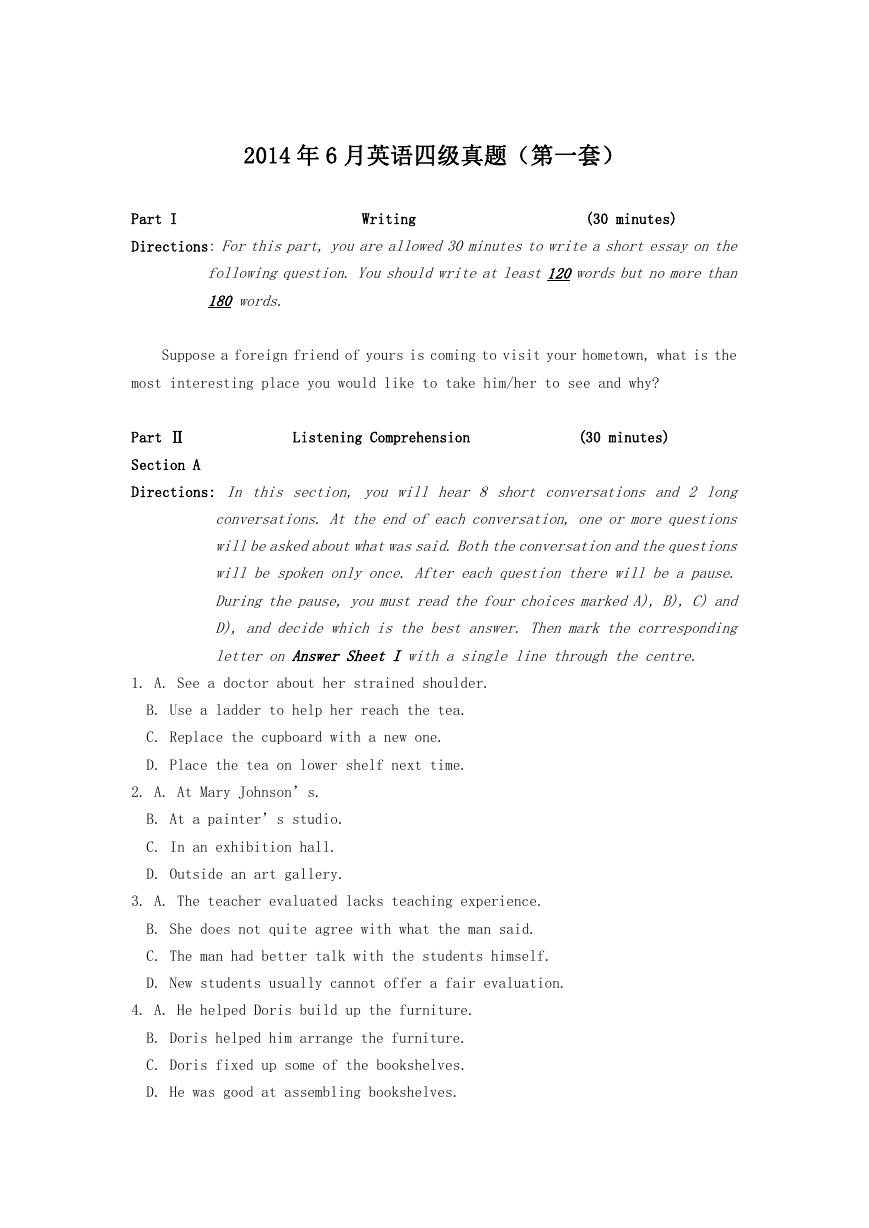
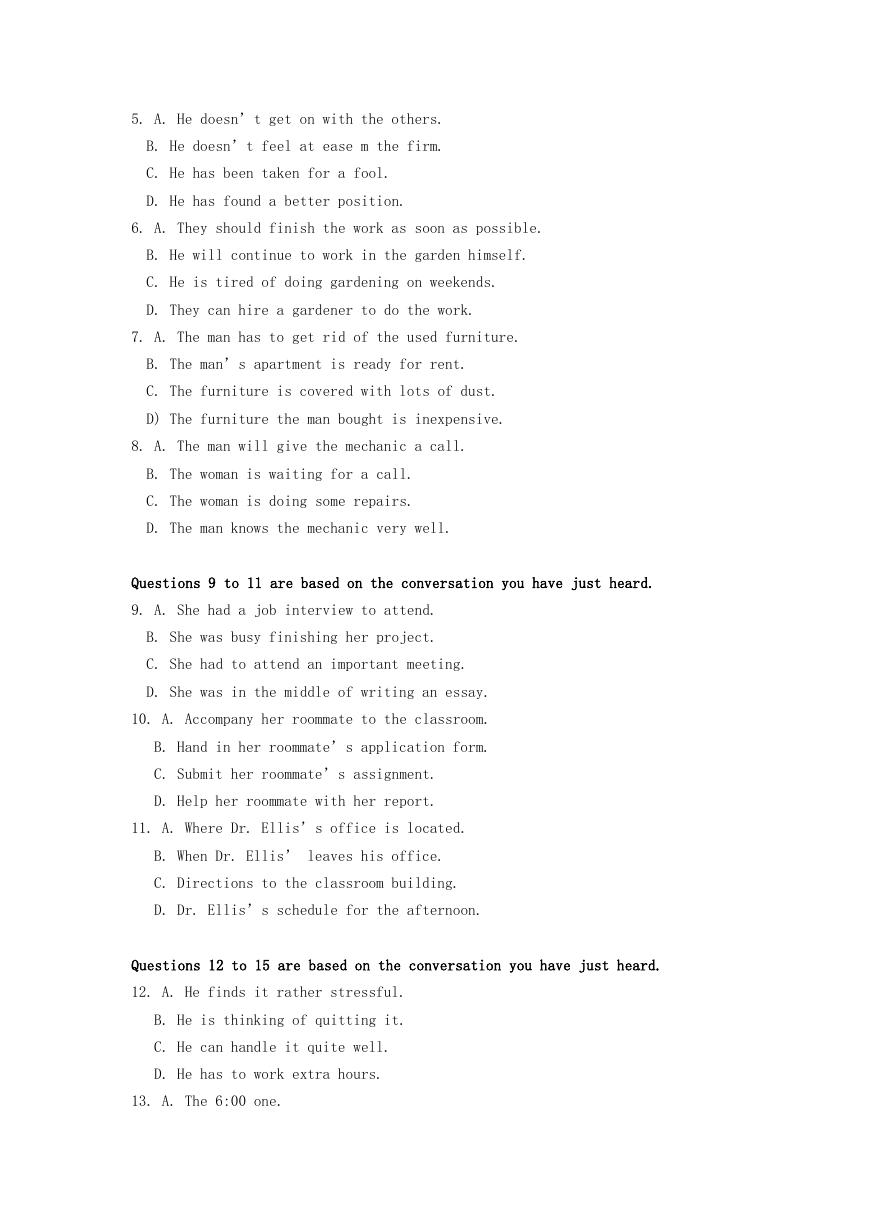
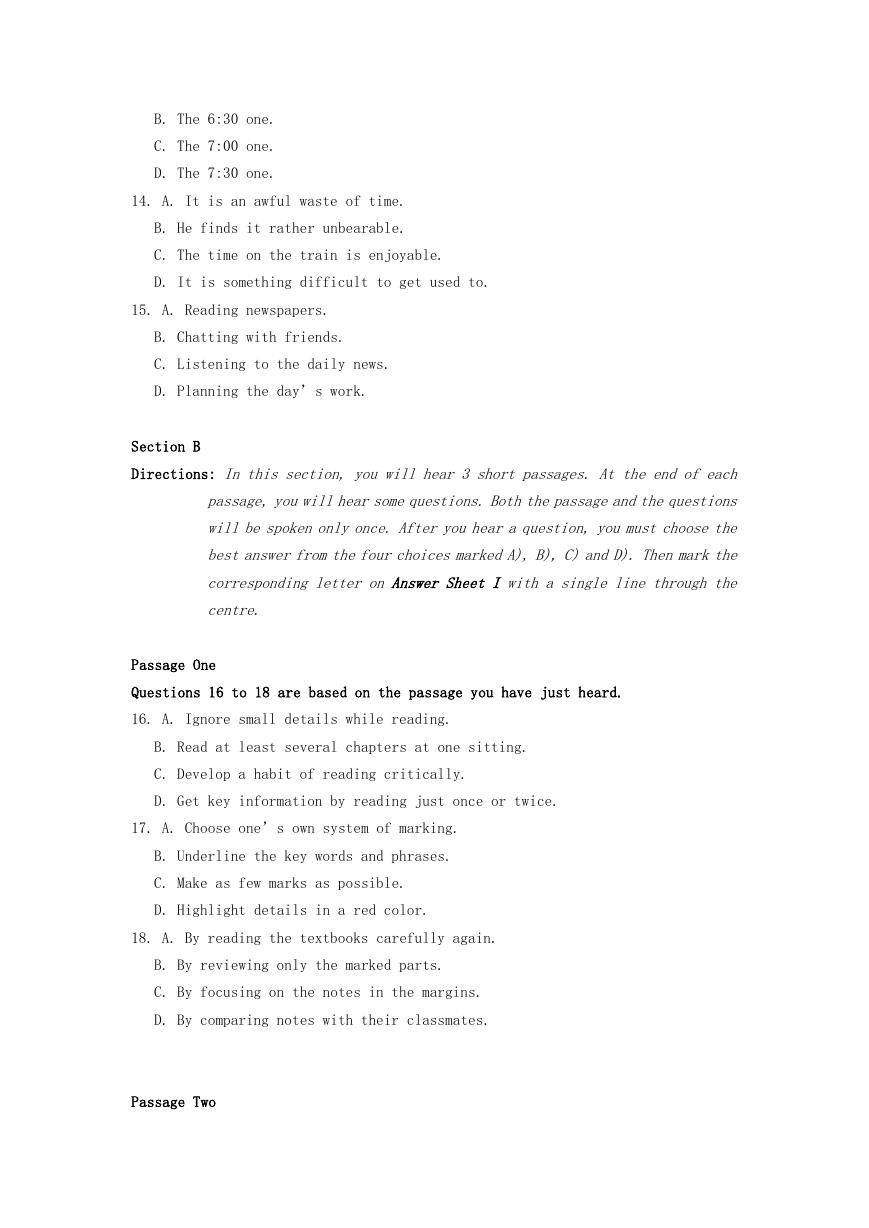
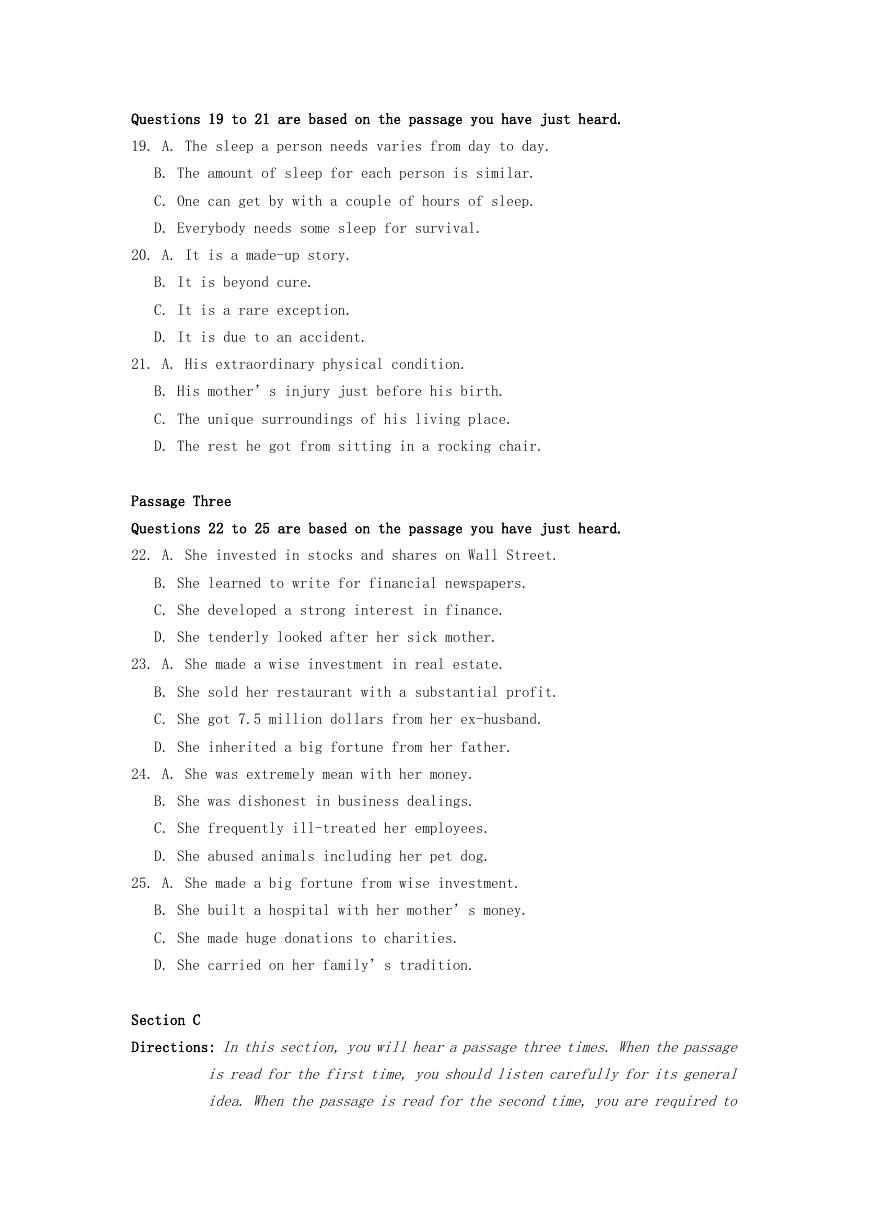
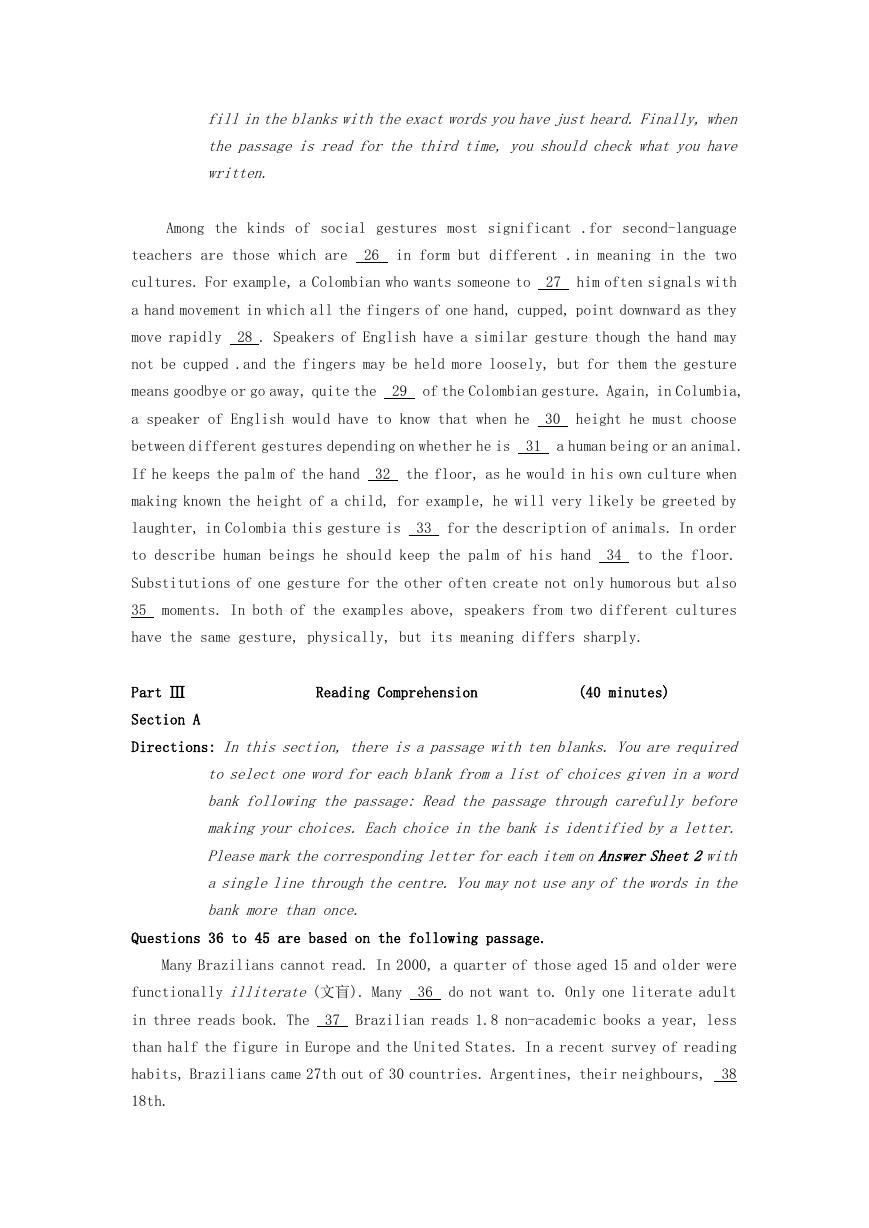
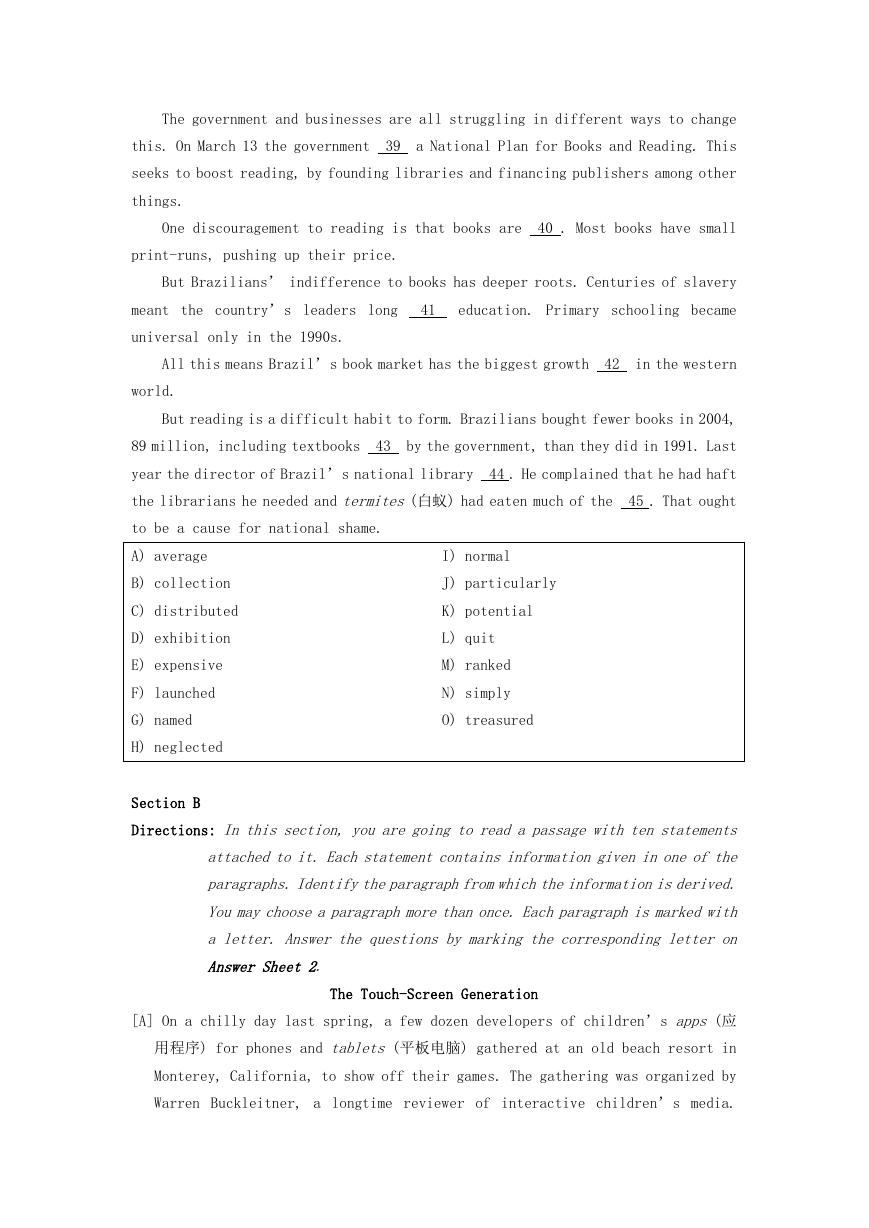
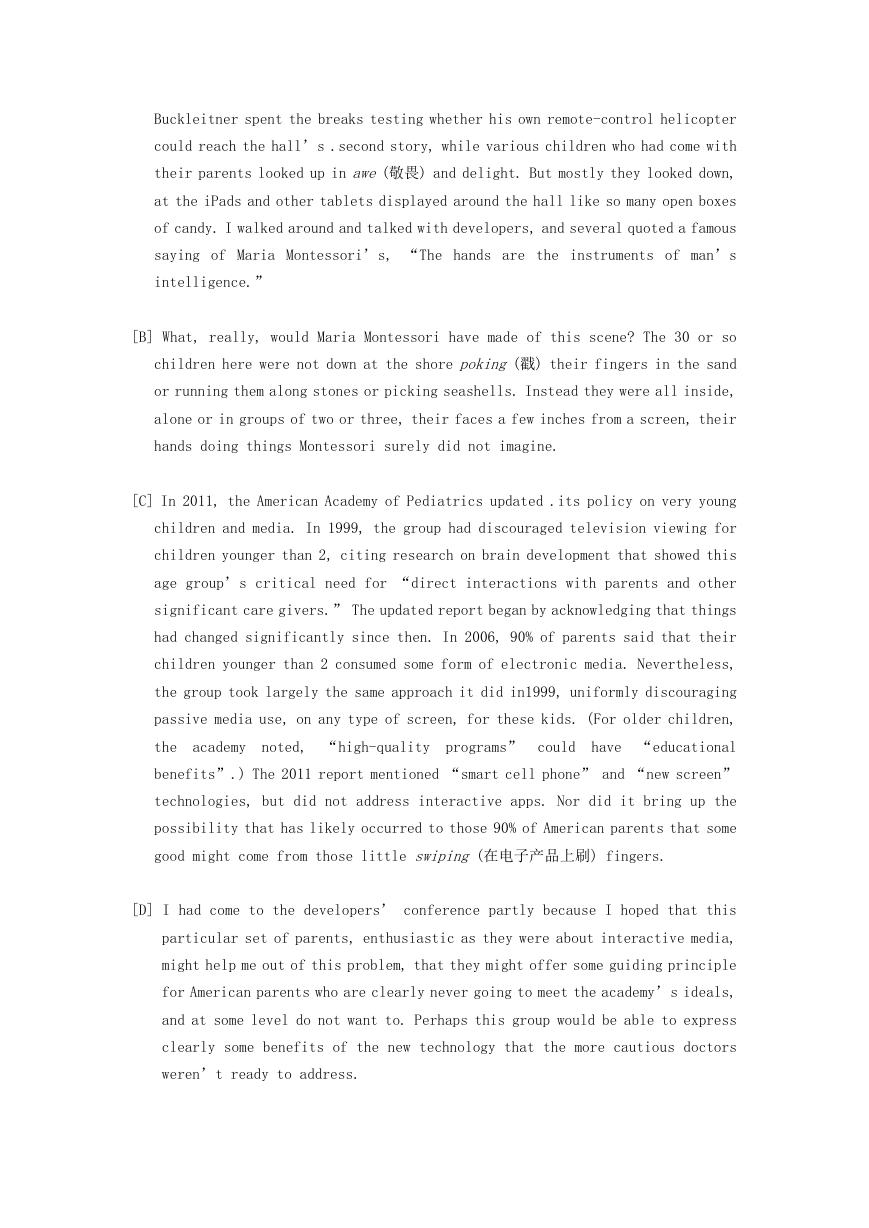
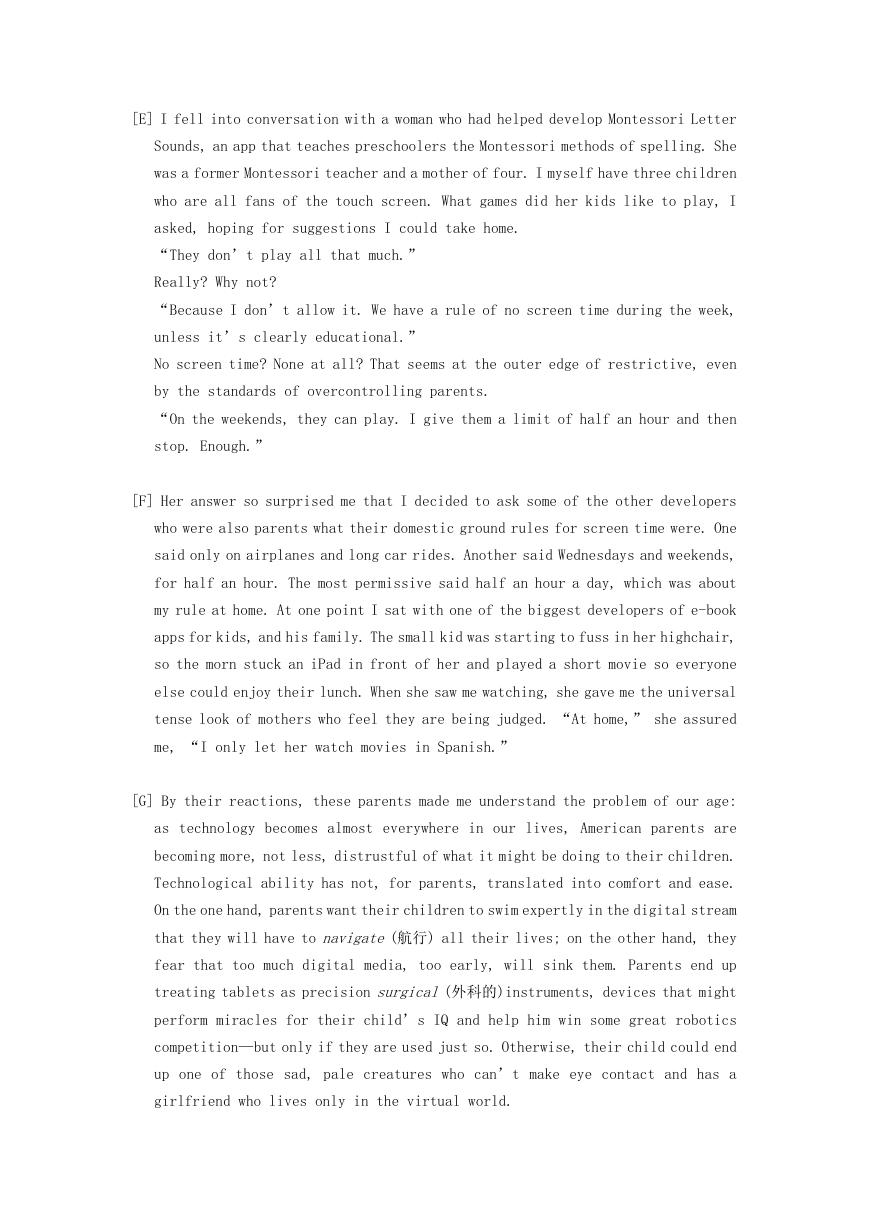








 2023年江西萍乡中考道德与法治真题及答案.doc
2023年江西萍乡中考道德与法治真题及答案.doc 2012年重庆南川中考生物真题及答案.doc
2012年重庆南川中考生物真题及答案.doc 2013年江西师范大学地理学综合及文艺理论基础考研真题.doc
2013年江西师范大学地理学综合及文艺理论基础考研真题.doc 2020年四川甘孜小升初语文真题及答案I卷.doc
2020年四川甘孜小升初语文真题及答案I卷.doc 2020年注册岩土工程师专业基础考试真题及答案.doc
2020年注册岩土工程师专业基础考试真题及答案.doc 2023-2024学年福建省厦门市九年级上学期数学月考试题及答案.doc
2023-2024学年福建省厦门市九年级上学期数学月考试题及答案.doc 2021-2022学年辽宁省沈阳市大东区九年级上学期语文期末试题及答案.doc
2021-2022学年辽宁省沈阳市大东区九年级上学期语文期末试题及答案.doc 2022-2023学年北京东城区初三第一学期物理期末试卷及答案.doc
2022-2023学年北京东城区初三第一学期物理期末试卷及答案.doc 2018上半年江西教师资格初中地理学科知识与教学能力真题及答案.doc
2018上半年江西教师资格初中地理学科知识与教学能力真题及答案.doc 2012年河北国家公务员申论考试真题及答案-省级.doc
2012年河北国家公务员申论考试真题及答案-省级.doc 2020-2021学年江苏省扬州市江都区邵樊片九年级上学期数学第一次质量检测试题及答案.doc
2020-2021学年江苏省扬州市江都区邵樊片九年级上学期数学第一次质量检测试题及答案.doc 2022下半年黑龙江教师资格证中学综合素质真题及答案.doc
2022下半年黑龙江教师资格证中学综合素质真题及答案.doc